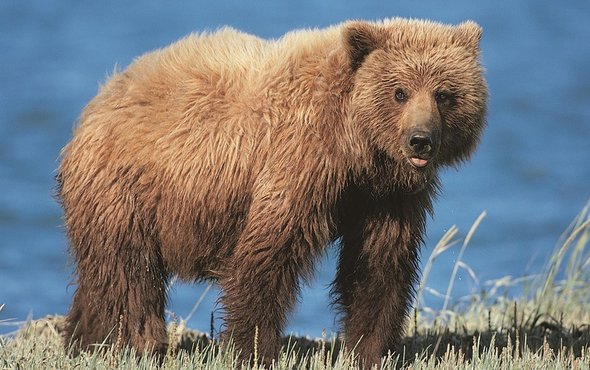(单词翻译:单击)
听力文本
This is Scientific American — 60-Second Science. I'm Jason G. Goldman.
In North America, many critters commonly encountered today—like wild turkeys or white-tailed deer—were brought back from near oblivion through conservation efforts led by hunters. Meanwhile, in Africa, some of the most charismatic species are now being hunted into extinction. But hunting can also have impacts that are far more subtle.
Take the brown bear, known here in the U.S. as the grizzly. When large mammals like grizzlies are hunted, evolution might select for speedier life cycles. That is, in order to successfully reproduce before they risk getting shot, bears might begin having cubs at a younger age. That change also allows them to reproduce more times throughout their lives. But that's not the only possible reaction to being hunted.
"The brown bear population in Sweden has been monitored for about 30 years. And researchers in Scandinavia have noticed that females started to change their reproductive strategies. And they would observe that females would keep their cubs for longer periods of time nowadays."
University of Sherbrooke biologist Joanie Van de Walle.
"Usually females give birth in January while in their den... But some females, rather than weaning their cubs after one year and a half, continue to care for them for an extra year."

So some brown bear mothers in this population began to spend more time, not less, caring for their cubs.
"And we have seen that since 2005 the proportion of females that keep their cubs for two years and a half has increased dramatically. Nowadays, its about 36 percent of females that use that tactic, whereas in the beggining of the study before 2005, it was about only 7 percent or so."
But that increased investment comes at a cost: by spending more time with their cubs, it takes longer before the mothers reproduce again. It seems as if evolution settled on a tradeoff: have fewer offspring, but invest more energy in their care. The finding is in the journal Nature Communications.
And the change can be traced to Swedish hunting regulations. The law prohibits killing females if they are accompanied by cubs. So females that happen to have the urge for extra maternal care don't get shot—and this also gives the youngsters protection and guaranteed nutrition.
The study underscores how different kinds of hunting regulations can lead to different outcomes for wild animals. This kind of knowledge helps wildlife managers ensure the long-term viability of wildlife populations, while also allowing for sustainable hunting—which itself can be a conservation tool.
For Scientific American — 60-Second Science. I'm Jason G. Goldman.
参考译文
这里是科学美国人——60秒科学。我是杰森·古德曼。
在北美,野火鸡或白尾鹿等现在常见的小生物,是经由猎人的保护,从近乎绝迹的状态重新恢复过来的。与此同时,在非洲,一些最具魅力的物种现在却几乎被猎杀殆尽。但是捕猎也可以产生更为微妙的影响。
以在美国被称为灰熊的棕熊为例。当灰熊这种大型哺乳动物被猎杀时,进化可能会选择更快的生命周期。也就是说,为了在面临被射杀的风险前成功繁殖,灰熊可能在更年轻时开始孕育幼崽。这一变化也使它们得以增加整个生命过程中的繁殖次数。但这不是灰熊面对捕猎做出的唯一反应。
“人们在约30年前开始监测瑞典棕熊的数量。斯堪的纳维亚的研究人员注意到,雌性棕熊已经开始改变它们的繁殖策略。他们观察到,现在雌性棕熊照顾幼崽的时间延长了。”
布鲁克大学的生物学家琼妮·范德瓦勒说到。
“通常来说,雌性棕熊1月份在兽穴里生下小熊,但有些雌性棕熊不会在一年半后让幼崽断奶,而是会继续哺育一年。”
因此,这一种群中的一些棕熊妈妈在照顾幼崽上花费的时间会更多,而不是减少。
“我们看到,自2005年以来,照顾幼崽两年半的雌性棕熊比例显著增加。现在约有36%的雌性棕熊采用这种策略,而在2005年之前,也就是研究初始阶段,只有约7%的母熊这样做。”
但是,增加哺育时长是要付出代价的:哺育幼崽时间增加,雌性棕熊再次繁育的间隔也会变长。看起来进化好像选定了一种折衷之法:后代数量减少,但是在哺育后代方面投入更多精力。这项研究发表在《自然沟通》期刊上。
这种变化可以在瑞典的捕猎规定中找出缘由。该法律禁止猎杀带有幼崽的母熊。因此,那些恰巧希望增加哺育时长的母熊便不会被射杀,这也给小熊提供了保护和营养保障。
这项研究强调,不同种类的狩猎规则可能让野生动物产生不同的结果。这种知识帮助野生动物管理者确保野生动物种群的长期生存能力,同时也允许可持续捕猎的存在,因为可持续捕猎本身也可以成为一种保护工具。
谢谢大家收听科学美国人——60秒科学。我是杰森·古德曼。
译文为可可英语翻译,未经授权请勿转载!
重点讲解
重点讲解:
1. care for 照料;照顾;护理;
They hired a nurse to care for her.
他们雇了个护士来照顾她。
2. or so …左右;…上下;
He did buy me those daffodils a week or so ago.
他确实在大约一个星期前给我买了那些水仙花。
3. settle on 选择;选定;
He helped me settle on which car to buy.
他帮助我决定买哪一辆车。
4. happen to do sth. 碰巧;凑巧;
She happened to be out when we called.
我们打电话时她刚巧不在家。


